Unit 137- Part A
We often use verbs with the following words:
| in out |
on off |
up down |
away back |
round through |
about along |
over forward |
by |
So you can say look out / get on / take off / run away etc. These are phrasal verbs.
We often use on/off/out etc. with verbs of movement. For example:
| get on drive off come back turn round |
• The bus was full. We couldn’t get on. • A woman got into the car and drove off. • Sally is leaving tomorrow and coming back on Saturday. • When I touched him on the shoulder, he turned round. |
| But often the second word (on/off/out etc.) gives a special meaning to the verb. For example: | |
| break down look out take off get on get by |
• Sorry I’m late. The car broke down. (= the engine stopped working) • Look out! There’s a car coming. (= be careful) • It was my first flight. I was nervous as the plane took off. (= went into the air) • How was the exam? How did you get on? (= How did you do?) • My French isn’t very good, but it’s enough to get by. (= manage) |
For more phrasal verbs, see Units 138-145.
Unit 137- Part B
Sometimes a phrasal verb is followed by a preposition. For example:
| phrasal verb |
preposition |
|
| run away keep up look up look forward |
from with at to |
• Why did you run away from me? • You’re walking too fast. I can’t keep up with you. • We looked up at the plane as it flew above us. • Are you looking forward to your holiday? |
Unit 137- Part C
Exercises
{slide=1 Complete each sentence using a verb from A + a word from B.}Complete each sentence using a verb from A (in the correct form) + a word from B. You can use a word more than once.
{tooltip}Key.{end-link}2 sit down
3 flew away
4 get out
5 speak up
6 get by
7 gone up
8 looked round{end-tooltip}
| A{xtypo_rounded3}fly get go look sit speak{/xtypo_rounded3} | B{xtypo_rounded3}away by down on out round up {/xtypo_rounded3} |
1 The bus was full. We couldn’t get in .
2 I’ve been standing for the last two hours. I’m going to ________________ for a bit.
3 A cat tried to catch the bird, but it ________________ just in time.
4 We were trapped in the building. We couldn’t ________________.
5 I can’t hear you very well. Can you ________________ a little?
6 ‘Do you speak German?’ ‘Not very well, but I can ________________.’
7 House prices are very high. They’ve ________________ a lot in the last few years.
8 I thought there was somebody behind me, but when I ________________, there was nobody there.
{/slide} {slide=2 Complete the sentences using a word from A and a word from B.}Complete the sentences using a word from A and a word from B. You can use a word more than once.
{tooltip}Key.{end-link}2 back at
3 up to
4 forward to
5 away with
6 up at
7 in through{end-tooltip}
| A{xtypo_rounded3}away back forward in up{/xtypo_rounded3} | B{xtypo_rounded3}at through to with{/xtypo_rounded3} |
1 You’re walking too fast. I can’t keep up with you.
2 My holidays are nearly over. Next week I’ll be ____________ work.
3 We went ____________ the top floor of the building to admire the view.
4 Are you looking ____________ the party next week?
5 There was a bank robbery last week. The robbers got ____________ £50,000.
6 I love to look ____________ the stars in the sky at night.
7 I was sitting in the kitchen when suddenly a bird flew ____________ the open window.
{/slide} {slide=3 Complete the sentences using the following verbs.}Complete the sentences using the following verbs + it/them/me:
{tooltip}Key.{end-link}2 wake me up
3 get it out
4 give them back
5 switch it on
6 take them off{end-tooltip}
1 They gave me a form and told me to fill it in .
2 I’m going to bed now. Can you ___________ at 6.30?
3 I’ve got something in my eye and I can’t ___________.
4 I don’t like it when people borrow things and don’t ___________.
5 I want to use the kettle. How do I ___________?
6 My shoes are dirty. I’d better ___________ before going into the house. {/slide} {slide=4 Use your own ideas to complete the sentences.}Use your own ideas to complete the sentences. Use a noun (this newspaper etc.) or a pronoun (it/them etc.) + the word in brackets (away/up etc.).
{tooltip}Key.{end-link}3 I have to take them back
4 We can turn the television off or We can turn off the television
5 I knocked it over
6 I don’t want to wake her up.
7 (example answer) You should put your coat on or You should put on your coat.
8 I was able to put it out
9 (example answer) they’ve put the price(s) up or they’ve put up the price(s)
10 Shall I turn the lightlsl on? or Shall I turn on the lighi(s)?{end-tooltip}
1 Don’t throw away this newspaper I want to keep it. (away)
2 ‘Do you want this postcard?’ ‘No, you can throw it away .’ (away)
3 I borrowed these books from the library. I have to take _______________ tomorrow. (back)
4 We can turn _______________. Nobody is watching it. (off)
5 A: How did the vase get broken?
B: I’m afraid I knocked _______________ while I was cleaning. (over)
6 Shh! My mother is asleep. I don’t want to wake _______________. (up)
7 It’s quite cold. You should put _______________ if you’re going out. (on)
8 It was only a small fire. I was able to put _______________ quite easily. (out)
9 A: Is this hotel more expensive than when we stayed here last year?
B: Yes, they’ve put _______________. (up)
10 It’s a bit dark in this room. Shall I turn _______________? (on)
{/slide}
помогите!!!!
. Complete each sentence with one of the words or phrases below.
characters find whenever broadsheets article events
managed approve celebrated wisdom
1. … have many detailed articles about national and international events.
2. It wasn’t easy but the football team … to win the match.
3. The Times or The Daily Telegraph generally give information about … happening in London.
4. I have read the book. I … it very interesting and exciting.
5. Soap opera is a programme where one and the same … appear in everyday life situations.
6. Have you read the … about the reforms in Higher Education. It’s worth reading.
7. … I phone him he’s always out.
8. I always … of people who have their own opinion and able to defend it.
9. The … of the ancients could help our generation if we have learned from it.
10. What other holidays can be … in the same way?
Progress
Check – 3
V – 1
I.
Find the word with the same or similar meaning.
Example: dull – c)
a) original b) fascinating c) boring
1. to report
a) to borrow b) to inform c) to explain
2. advertisement
a) commercial b) review c) quiz
3. headline
a) article
b)
title c) conclusion
4. quality
a) popular b) original c) serious
5. handbook
a) manual b) guidebook c) encyclopedia
6. fascinating
a) gripping b) brilliant c) amusing
II.
Complete each sentence with one of the words or phrases below.
whenever wisdom tabloids events celebrate prove
book broadcast issue suggested
1. … contain a lot of photographs
and have a more sensational reporting style.
2. Smoking is bad. Can you … it?
3. Local newspapers give information on different … happening in the
local area.
4. I’d like to … tickets for a group of students to London.
5. Series is a long drama or comedy or documentary that is … in parts,
usually at a certain time of day.
6. The first … of the newspaper “The Daily Courant” was published in London in 1702.
7. … you ask for help, I’ll help you.
8. My uncle … making green tea as it is very good for the health.
9. Mikhail Lomonosov was known as a man of great … .
10. How did you … the turn of the century?
III. The word in capitals above each of the
following sentences can be used to form a word that fits suitably in the blank
space. Fill each blank in this way.
Example: MANAGE
He is the manager of a popular singer.
1. DAY
… newspapers are published on
every day of the week except Sunday.
2. COMMENT
Who is your favourite TV … ?
3. COMMUNCATE
Pamela thinks that the Internet
is the most useful means of … .
4. CULTURE
I prefer to read articles about
… affairs in our town.
5. PRINT
I think CD books will be much
more popular with teenagers of my generation than … books.
IV.
Complete the sentences. Choose the correct variant.
Example: I’ve got a lot of …
(work/ works) to do for the weekend. –
I’ve got a lot
of work
to do for the weekend.
1. What (is/ are) her progress in
English?
2. (Is/ Are) there any news from Andy?
3. Where (is/ are) Granny’s glasses?
4. (Is/ Are) these goods from America?
5. I got a lot of useful (information/ informations).
6. Do you eat much (fruit/ fruits)?
7. I like any kind of (weather/ weathers).
V.
Complete the sentences. Choose the correct variant.
Example: My mother disapproved of … (to read/ reading)
thrillers. —
My mother
disapproved of reading thrillers.
1. I have never dreamed of (to win/ winning) a competition.
2. My sister always enjoys (to go/ going) for a walk.
3. The angry neighbour told the teenagers to stop (to speak/ speaking)
too loud.
4. Do you think she’ll manage (to pass/ passing) her Maths exam?
5. My mum is always at home. She quitted (to work/ working) last year.
6. The teacher reminded us (to bring/ bringing) some flowers to decorate
the classroom.
7. Linda suggested me (to drink/ drinking) a cup of tea now.

V O C A B U L A R Y 15 HEALTH A N D THE BODY
|
9 Decide which answer (A, B, C or D) best fits each space. |
||||
|
A disastrous holiday |
||||
|
The day Gerald arrived at the Almara Beach Hotel, he fell (1) |
A |
the |
||
|
stairs. The manager called a/an (2) |
, but fortunately Gerald’s leg |
|||
|
was only badly (3) |
, and not broken. The doctor (4) |
|||
|
swimming as further (5) |
but gave Gerald a/an (6) |
for |
||
|
some tablets in case his leg became (7) |
The next day Gerald |
|||
|
sunbathed by the pool, and then took a deep (8) |
and dived into |
|||
|
the water. There was not very much water in the pool, and he (9) |
one of his arms when he hit the bottom. This time he complained to the hotel manager, who sent a special meal to Gerald’s room. Later that night, Gerald was
|
(10) |
from a (11) |
back, the injuries to his arm and leg, |
|||
|
and also had a terrible (12) |
He had a high (13) |
and |
|||
|
felt terrible. Luckily he had the tablets the doctor had given him to |
|||||
|
(14) |
the pain. As he reached for them, he fell out of bed and broke |
||||
|
his (15) |
He spent the rest of his holiday in bed. |
||||
|
1) |
A down |
B to |
C with |
D for |
|
|
2) |
A stretcher |
B prescription |
C ambulance |
D emergency |
|
|
3) |
A sick |
B bruised |
C hurt |
D infected |
|
|
4) |
A went |
B prevented |
C said |
D recommended |
|
|
5) |
A medicine |
B cure |
C drugs |
D treatment |
|
|
6) |
A recipe |
B paper |
C prescription |
D order |
|
|
7) |
A painful |
B pained |
C painless |
D pain |
|
|
|
A end |
B breath |
C mouthful |
D water |
|
|
9) |
A hurt |
B injury |
C ached |
D sore |
|
|
10) |
A ill |
B injured |
C suffering |
D damaged |
|
|
11) |
A sunny |
B sunburnt |
C sunshine |
D grilled |
|
|
12) |
A agony |
B hurt |
C heat |
D stomachache |
|
|
13) |
A pain |
B temperature |
C ache |
D degree |
|
|
14) |
A hold |
B check |
C rid |
D reduce |
|
|
15) |
A waist |
B lips |
C wrist |
D throat |
|
273
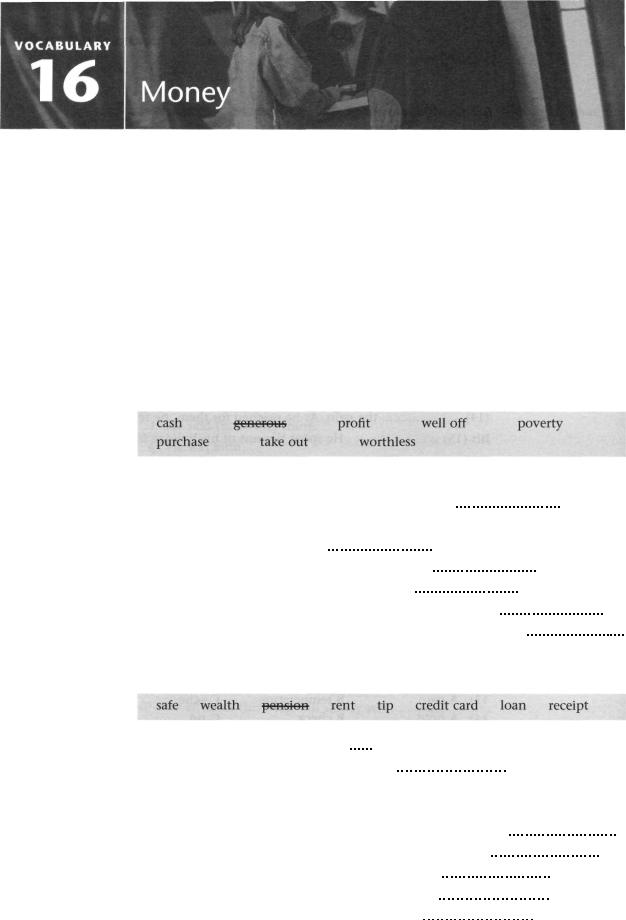
Underline the most suitable word or phrase.
a)I haven’t got enough money, I’m afraid. Could you borrow/lend me some?
b)This car is too expensive. We can’t afford/pay it.
c)There’s a small flat to hire/let in Bridge Street.
d)How much do you earn/gain in your new job?
e)She’s a good dentist, but she doesn’t charge/spend too much.
f)I bought this coat in the sales. It was decreased/reduced a lot.
g)Jack made his fortune/treasure buying and selling property.
h)How much do you reckon/value that house would cost?
2Replace each word or phrase in italics with a word or phrase from the box which has the opposite meaning.
|
a) |
I was surprised by how mean |
Charles was. ..generous…. |
|
b) Janet says that she is very hard up at the moment |
||
|
c) |
Last year their business |
made a huge loss. |
d)I’d like to pay in £100 please
e)Most people in the city live in great prosperity
f)The manager insisted that I paid by cheque
g)Jean was able to make only one sale during the morning
h)The old painting I found in the loft turned out to be valuable
3 Complete each sentence with a word from the box. Use each word once only.
|
a) |
The old couple had only a small |
pension….. |
to live on. |
|
b) |
My uncle Sam acquired his considerable |
selling cars. |
c)David never carries cash with him and pays for everything by
d)I wouldn’t have been able to buy my boat without a bank
e)The shop won’t change any goods without the original
f)Keith didn’t like the waiter so he didn’t leave a
|
g) |
The house is not in very good condition so the |
is low. |
|
h) |
We keep all our money and valuables in this |
in the floor. |
274
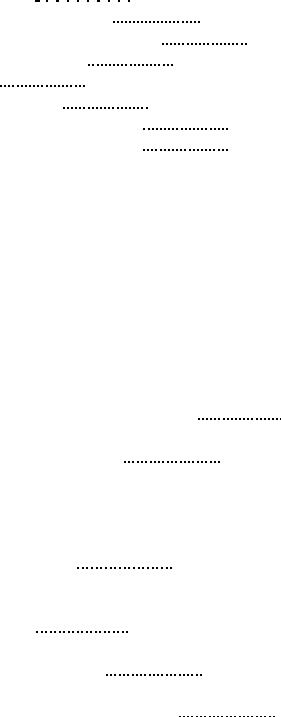
V O C A B U L A R Y 16 MONEY
4Match each sentence (a-h) with a suitable response (1-8). Use each response once only.
a)Who do I make the cheque out to? 6
b)We seem to be spending a lot of money lately
c)The house has burnt down! What are we going to do?
d)How much do you want for this drawing?
e)Did you inherit this house?
f)Do we still owe the bank any money?
g)Can we change money at the hotel to pay the bill?
h)Why are you putting so much money in the bank?
1 Sorry, but it’s not for sale.
2I’m saving up to buy a new motorbike.
3Perhaps we should try to economise a bit.
4Yes, my Aunt Clara left it to me.
5Well, we’ve nearly paid it all back.
6To JB Woolbury PLC.
7I think they accept travellers cheques anyway.
8Don’t worry, we’re insured.
5 Choose the most suitable word or phrase to complete each sentence.
|
a) |
I bought |
these shoes |
in |
the |
sale. |
They were a real |
C…….. . |
|||||
|
A) cheap |
B) economy |
C) bargain |
D) purchase |
|||||||||
|
b) |
If you put your money in the bank, |
it will earn ten per cent |
||||||||||
|
A) interest |
B) profit |
C) deposit |
D) investment |
|||||||||
|
c) John asked his parents if they would pay off his |
||||||||||||
|
A) rents |
B) debts |
C) accounts |
D) credits |
|||||||||
|
d) Adults have to pay £8 to get in, but children under fourteen get in |
||||||||||||
|
A) free |
B) nothing |
C) penniless |
D) open |
|||||||||
|
e) |
I’m trying to save for my holidays so I’m |
some money each |
||||||||||
|
week. |
||||||||||||
|
A) putting in |
B) putting aside |
C) putting behind |
D) putting up |
|||||||||
|
f) |
Just a minute! You’ve forgotten to |
your cheque! |
||||||||||
|
A) mark |
B) make |
C) place |
D) sign |
|||||||||
|
g) The blackmailer asked for the money in used |
||||||||||||
|
A) notes |
B) cheques |
C) paper |
D) cash |
h)I gave the assistant ten euros and she gave me four euros
A)rest B) money C) coins D) change
275
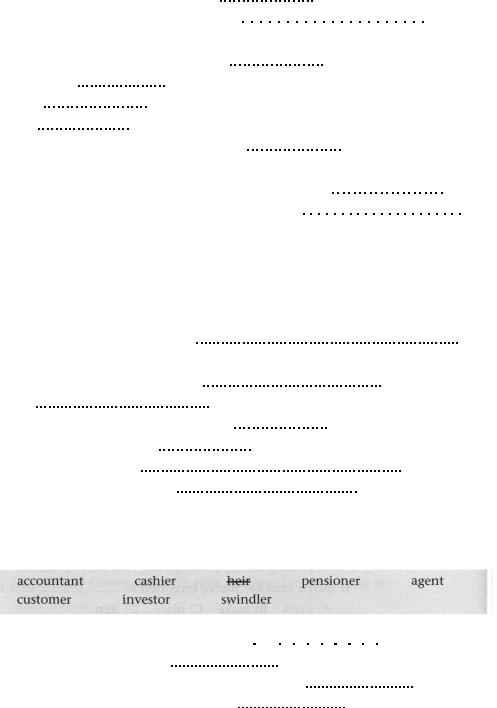
FIRST CERTIFICATE LANGUAGE PRACTICE
6Use the word given in capitals at the end of each line to form a word that fits in the space in the same line.
|
Money! Money! Money! |
|||
|
Helen had always dreamed of becoming a (1) |
….wealthy.. |
WEALTH |
|
|
woman, and imagined living in a (2) |
mansion, |
LUXURY |
|
|
and how her friends would praise her (3) |
GENEROUS |
||
|
when she gave them expensive presents. In reality she |
|||
|
was usually hard up. She had some (4) |
and a |
SAVE |
|
|
small life (5) |
, but her antique shop was not really |
INSURE |
|
|
very (6) |
Every time she took money out of the bank, |
PROFIT |
|
|
the (7) |
checked her account, and told her how little |
CASH |
|
|
there was in it! Helen had taken out a (8) |
a month |
LEND |
|
|
before. How could she repay it? Then one day she noticed |
|||
|
an old painting in her shop. She had thought it was (9) |
WORTH |
||
|
but as she brushed away the dust, she saw the (10) |
SIGN |
||
|
at the bottom. It said ‘Renoir’! She was rich at last! |
7 Complete each sentence with a word or phrase formed from pay. Each space
|
represents one word. |
|||
|
a) |
You can pay the full price now, or make six monthly …payments…. . |
||
|
b) |
If you lend me the money, I’ll |
next |
|
|
week. |
|||
|
c) |
I haven’t got enough money to |
the suit now. |
|
|
d) |
We |
a lot of money on decorating this house. |
|
|
e) |
I must do something about all these |
bills. |
|
|
f) |
Please make the cheque |
to R.D. Smith. |
|
|
g) Take this money and |
to the bank. |
||
|
h) |
I like my job, and it’s very |
8Match the words in the box with a suitable definition (a-h). Use each word once only.
a)Someone who inherits money or property heir
b)Someone who has retired
c)Someone who keeps or checks financial records
d)Someone who buys things in a shop
276

VOCABULARY 16 MONEY
e)Someone who pays out money in a bank
f)Someone who represents others in business
g)Someone who puts money into a business
h)Someone who cheats people out of money
9 Decide which answer (A, B, C or D) best fits each space.
|
Money matters |
|||||
|
Are you always (1) |
B |
up? Do you often have to (2) |
|||
|
money from your parents whenever you need a little extra (3) |
? If |
||||
|
you (4) |
too much, and save too little, you will end up with more |
||||
|
(5) |
than friends. You know the solution, of course: just save a |
||||
|
small (6) |
every month. Most banks will pay (7) |
on |
|||
|
your savings, and you will soon be able to (8) |
all those things |
which seemed to cost too much before. The trouble is, you’re a university student, and many banks treat you like a child. But not us. If you open a/an
(9)with Smith Fulton Bank before October 31st, we’ll not only
|
send you your own (10) |
book and credit (11) |
, but |
|
|
you’ll also receive a copy of our booklet ‘Putting Money (12) |
for |
||
|
Your Future’. Smith Fulton can pay your (13) |
, help you with |
||
|
special student (14) |
, and your |
friendly branch |
(15) |
can give you advice for the future. We believe in you. Why not believe in us and open an account?
|
1) |
A shut |
B hard |
C debt |
D money |
|
2) |
A borrow |
B lend |
C save |
D pay |
|
3) |
A cheque |
B pension |
C wealth |
D cash |
|
4) |
A sign |
B spend |
C cost |
D cheat |
|
5) |
A owe |
B loans |
C debts |
D profits |
|
6) |
A amount |
B number |
C note |
D rest |
|
7) |
A receipts |
B credits |
C rents |
D interest |
|
|
A lend |
B economise |
C afford |
D spend |
|
9) |
A cheque |
B customer |
C bill |
D account |
|
10) |
A loan |
B cheque |
C cash |
D money |
|
11) |
A plastic |
B tip |
C card |
D cheque |
|
12) |
A aside |
B up |
C inside |
D work |
|
13) |
A sales |
B bets |
C bargains |
D bills |
|
14) |
A coins |
B loans |
C fortunes |
D pensions |
|
15) |
A miser |
B swindler |
C manager |
D cashier |
277
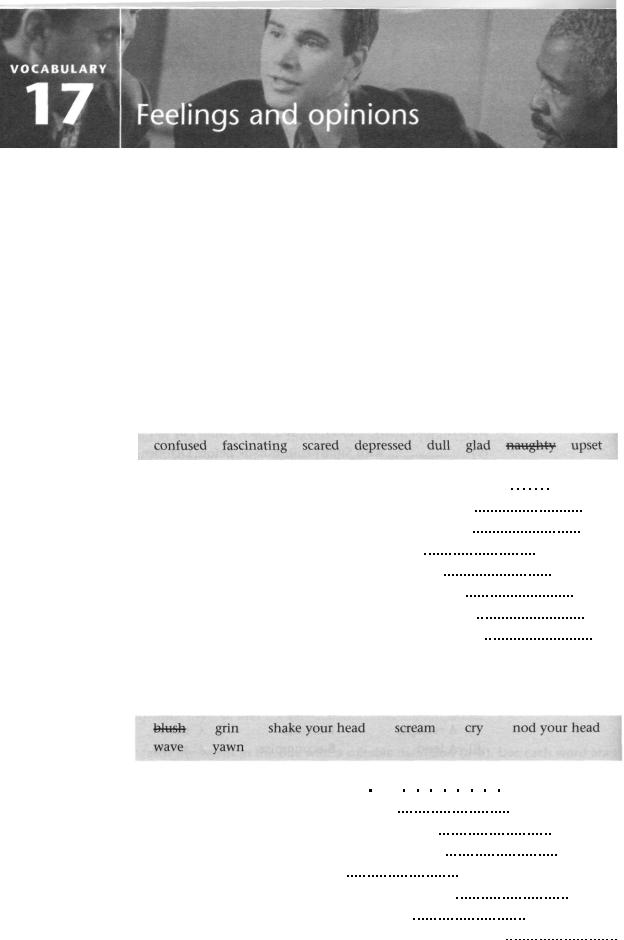
Underline the most suitable word or phrase.
a)When Dick saw his neighbour kick his dog he became angry/nervous.
b)Sue wasn’t really interested/interesting in the film.
c)We were both afraid/anxious that we would miss the plane.
d)I wish you wouldn’t snap your fingers. It’s very annoying/worrying.
e)You’re not scared/thrilled of spiders, are you?
f)If we forget to do our homework, our teacher gets cross/terrifying.
g)Tim completely lost his temper! He was absolutely furious/upset.
h)Your written work is full of careless/naughty mistakes.
2Replace the word(s) in italics with a suitable word from the box. Use each word once.
|
a) I’m afraid the children have been very badly-behaved today |
naughty….. |
b)I felt a bit frightened when I went into the dark room
c)Jean was very unhappy when her kitten was run over
d)This film we saw last night was rather boring
e)This is a really interesting book. You must read it
f)I’m so happy that Helen has got the job she wanted
g)Sometimes when I hear the news I feel very miserable
h)Sorry I gave you the wrong tickets. I got a bit mixed up
3Complete each sentence with a word or phrase from the box. Use each word or phrase once only.
a) When you feel embarrassed you might blush blush
b)When you feel tired or bored you might
c)When you want to show agreement you might
d)When you want to show amusement you might
e)When you feel upset you might
f)When you want to show disagreement you might
g)When you are scared or in pain you might
h)When you want to attract someone’s attention you might
278
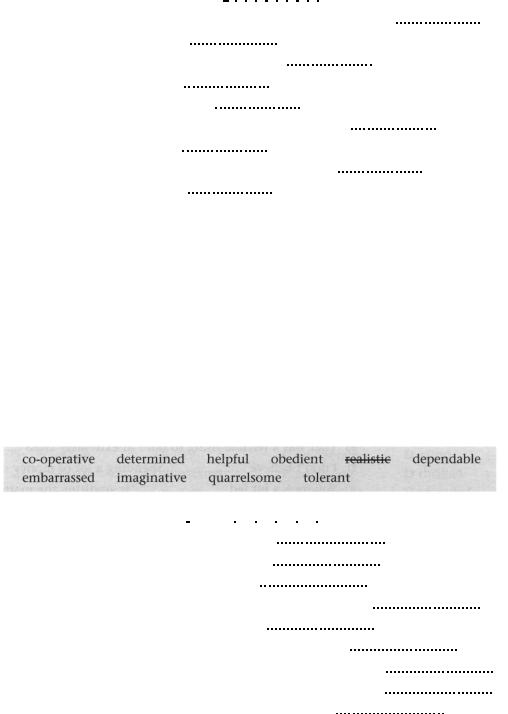
V O C A B U L A R Y 1 7 FEELINGS A N D O P I N I O N S
4Match each sentence (a-j) with a suitable response (1-10). Use each response once only.
a)How do you feel about folk music? 6
b)Do you have any comment on the Prime Minister’s decision?
c)I feel really miserable today
d)Is it all right if I invite some friends round?
e)Shall I do the washing-up?
f)I like this vase. Is it an antique?
g)Don’t you think you should treat your mother better?
h)Is my homework all right?
i)Do you think I should order the tickets in advance?
j)Did you enjoy the concert?
1 You can do whatever you like, as far as I’m concerned.
2In my opinion, the most important matter has been forgotten.
3Mind out, you might drop it!
4I didn’t think much of it, actually.
5I’m sorry, but it just won’t do.
6I’m not very keen on that kind of thing, to be honest.
7No, don’t bother, I’ll do it.
8Why don’t you mind your own business!
9Never mind, cheer up!
10No, it’s not worth it.
5Match each word or phrase from the box with a suitable description (a-j).
a)If you this, you face up to facts realistic
b)If you are this, you might make up stories
c)If you are this, you carry out instructions
d)If you are this, you don’t give up easily
e)If you are this, you put up with other people’s differences
f)If you are this, people can count on you
g)If you are this, you keep falling out with other people
h)If you are this, you might put yourself out for someone else
i)If you are this, you can’t put up with people looking at you
j)If you are this, you get on well working with others
279

FIRST CERTIFICATE LANGUAGE PRACTICE
6Use the word given in capitals at the end of each line to form a word that fits in the space in the same line.
|
Film review |
|||
|
Battle for your heart is the new film starring Hugh |
|||
|
Grade. I’m afraid that my first (1) ..impression.. |
was not |
IMPRESS |
|
|
very favourable. The scenes of violence are (2) |
OFFEND |
||
|
and the main character, Tony, is simply (3) |
IRRITATE |
||
|
The audience is supposed to feel great (4) |
for |
ADMIRE |
|
|
Tony, an army officer, who is accused of (5) |
COWARD |
||
|
because he fails to attack the village where the (6) |
ADORE |
||
|
Miranda lives with her old father. Tony saves |
|||
|
their lives, and although the idea of marrying Tony |
|||
|
has little (7) |
for her, Miranda agrees to it out |
ATTRACT |
|
|
of (8) |
However, she is still in love with Alex, |
GRATEFUL |
|
|
one of the enemy army, and wants to remain (9) |
FAITH |
||
|
to him. The dialogue and acting are just as bad |
|||
|
as the plot. At the end, I breathed a sign of (10) |
RELIEVE |
7 Complete each sentence with one suitable word.
|
a) |
You should be ashamed |
of. |
your behaviour! |
||
|
b) |
Do you like chocolate cake? I am very fond |
it. |
|||
|
c) |
Young David has got |
trouble as usual. |
|||
|
d) Are you laughing |
me? Do I look funny? |
||||
|
e) |
That was a terrible thing to do! I’m extremely cross |
you! |
|||
|
f) |
I don’t believe |
spending a lot of money on clothes. |
|||
|
g) |
You look a bit fed |
Is anything the matter? |
|||
|
h) |
I’m very keen |
classical music, actually. |
|||
|
i) |
In reply to Jack’s questions, Sue shook |
head. |
|||
|
j) |
Cheer |
! Try laughing for a change. |
280
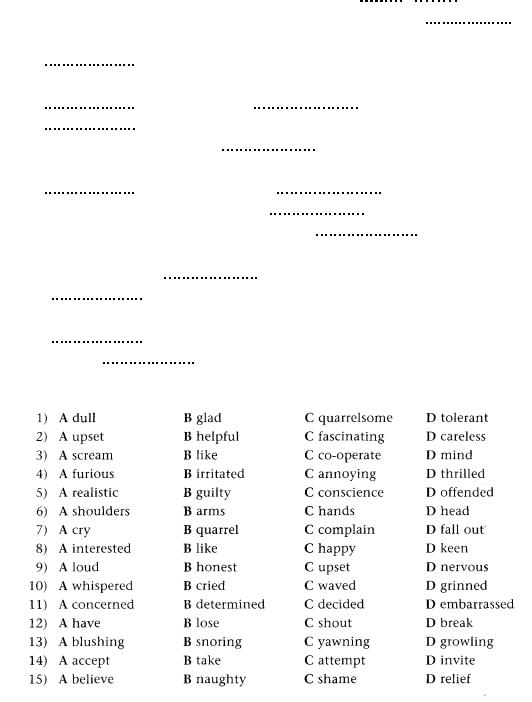
V O C A B U L A R Y 1 7 FEELINGS A N D O P I N I O N S
8 Decide which answer (A, B, C or D) best fits each space.
|
Noisy neighbours |
|||||
|
Julie always thought of herself as an easy going and (1) |
D. |
person, |
|||
|
who put up with people’s differences. She hardly ever became (2) |
|||||
|
about anything, and believed that if you treated people well, they would |
|||||
|
(3) |
with you. That is, until Alex and Harry moved in next door. At |
||||
|
first, when their music woke her in the night, she was just a bit |
|||||
|
(4) |
, but did not feel (5) |
She shrugged |
her |
||
|
(6) |
and said to herself, ‘Never mind, I make a lot of noise |
||||
|
sometimes. I’ll go round and (7) |
, in as nice a way as possible.’ |
||||
|
When she knocked at Alex and Harry’s door she said, ‘I’m not very |
|||||
|
(8) |
on loud music, to be (9) |
Do you think you |
|||
|
could turn it down a bit?’ They just (10) |
, and then Alex said, ‘You |
||||
|
can think whatever you like, as far as we’re (11) |
‘ Then they shut |
||||
|
the door in Julie’s face. By the end of the week, Julie felt angry, but was |
|||||
|
determined not to (12) |
her temper. She had hardly slept, and kept |
||||
|
(13) |
all the time, but she kept busy. The next time she called next |
door, she gave Harry and Alex a present. ‘It’s just a cake I made for you. Please
|
(14) |
my apologies for last time!’ And that day the noise stopped. |
|
‘What a (15) |
,’ thought Julie. ‘Now there’s some peace and quiet |
and I can read my favourite book The History of Poison …’
281
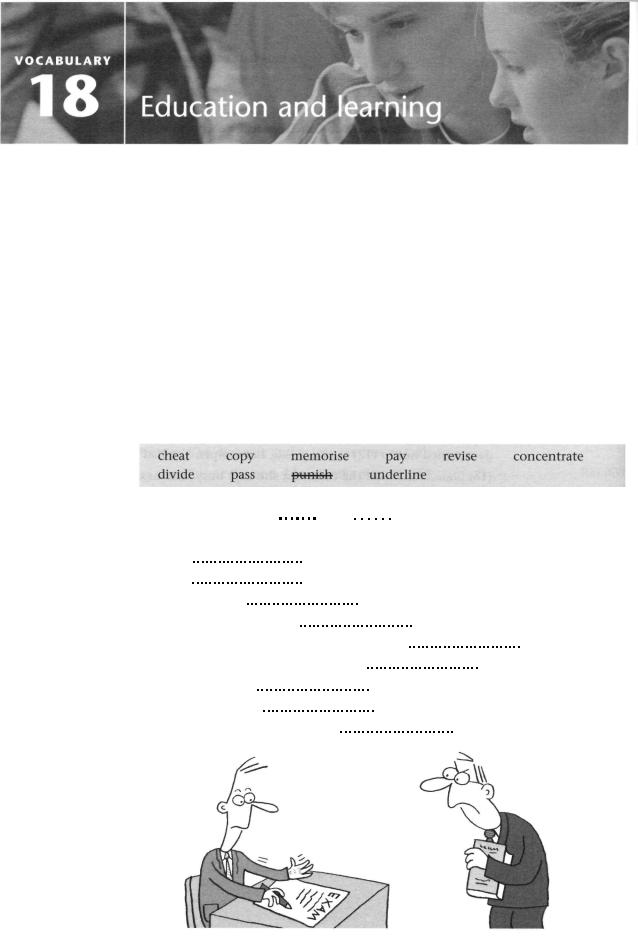
Underline the most suitable word or phrase.
a)Jack decided to take a course/lesson in hotel management.
b)Sheila always got good marks/points in algebra.
c)After leaving school, Ann studied/trained as a teacher.
d)Peter decided not to go in/enter for the examination.
e)My sister learned/taught me how to draw.
f)I can’t come to the cinema. I have to read/study for a test.
g)In history we had to learn a lot of dates by hand/heart.
h)I hope your work will improve by the end of course/term.
i)Martin failed/missed his maths exam and had to sit it again.
j)If you have any questions, raise/rise your hand.
2 Complete each sentence with a word from the box. Use each word once only.
|
a) |
Our teachers used to |
punish |
us by making us stay behind after |
|
|
school. |
||||
|
b) |
If you |
twenty-seven by nine, the answer is three. |
||
|
c) |
Try to |
the most important rules. |
||
|
d) |
It is difficult to |
attention in |
a noisy classroom. |
|
|
e) |
Pauline tried her best to |
the end of year examinations. |
||
|
f) |
Your work is the same as Harry’s. Did you |
his work? |
||
|
g) |
Your mind is wandering! You must |
more! |
||
|
h) |
Helen decided to |
all her work at the end of every week. |
||
|
i) |
It’s a good idea to |
important parts of the book in red. |
||
|
j) |
The teacher saw Jerry trying to |
in the exam. |
282
Соседние файлы в папке English_books
- #
- #
- #
- #
- #
- #
- #
- #
1 Complete each sentence with a word from the
box:
a) Most of the young people on the boat slept on the deck.
in their sleeping bags.
b) As the train drew in to the station, Terry could see her sister
waiting on the ….
c) I was so nervous about flying that I left my bag in the…
d) By the time I got to the… , the bus to Scotland had left.
e) As soon as the boat left the… , the storm began.
f) We hadn’t had anything to eat, but luckily there was a …on the train.
g) I’m afraid there is only one first-class …free on the boat.
h) Tim reached Paris safely, but his luggage didn’t reach its …
i)
There was a queue of cars on the … , waiting for the car-ferry to the island.
j) Our plane nearly crashed into a fire-engine
on the…
2 Underline the most suitable word (s):
a) David’s plane was cancelled/delayed by thick fog.
b) The ship’s owner agreed to give the crew/passengers a
pay-rise.
c) The plane from Geneva has just grounded/landed.
d) We hope that you will enjoy your flight/flying.
e) Because of heavy snow, their plane was diverted/deviated to
Luton.
f) I won’t be long. I’m just packing my last luggage/suitcase.
g) You have to check in/check up an hour before
the plane leaves.
h) All duty
free goods must be declared/surrendered at customs.
i) The plane took off/took up and was soon high over the city.
j) I bought a simple/single ticket, as I was going to return by
car.
k) A sign above the seats in the plane says ‘Fasten your life
belt/seat belt’.
1)
On the plane the flight attendant/waitress brought me a newspaper.
3 Use a word or words from
exercises 1 or 2 to complete each sentence. The word may be in a different
form.
a) I had to cancel my tickets, because I was ill and
couldn’t travel.
b) The train for London is now arriving at… three.
c) The plane …on time but arrived half an hour late.
d) We finally reached our… after travelling all day.
e) It was hard to find a seat on the train as there were so many …
f) While we were waiting at the station we had a bite to eat in the …
g) I felt seasick so I went to my …and tried to sleep.
h) Do you want a return ticket, or a …?
i) The customs officer asked Bill if he had anything to …
j) There is a small …here for fishing boats and yachts.
k) How much …can I take with me on the plane?
1) The 8.55 from Hull will be 30 minutes late. We
apologise for the…
4 Match the words in the box with
the suitable definition:
a) A journey by ship for pleasure a cruise
b) A journey by plane
c) The plan of a journey
d) An informal word for journey. Sometimes meaning a short
journey
e) A journey for a scientific or special purpose
f) A holiday which includes organised travel and accommodation
g) Taking journeys, as a general idea
h) A journey by sea
i) An organised journey to see the sights of a place
j) A journey from one side of the sea to the other
5 Use the words from the previous
exercise in these sentences.
a) The travel agent will send you the itinerary… for
your trip.
b) My neighbours went on a guided of Rome.
c) Last time I went from England to France we had a very rough
d) The first prize in the competition is a luxury Mediterranean
e) When you go on a/an , you pay one price for everything.
f) The college organized a/an to search for the ancient ruins.
g) Olympic announces the arrival of OA 269 from Athens.
h) The Titanic sank on its first in 1912.
i) is one of my main interests.
j) Mr Dean is away on a business at the moment. Can
I help you?
6 Replace the words in italics
in each sentence with a word from the box.
camp-site book hostel
accommodation double room hitch-hike
guest-house
a fortnight
vacancy
porter
a) I stayed in France for two weeks last year. .a
fortnight..
b) It’s difficult to find anywhere to stay here in the summer
c) We had no money so we had to get lifts in other people’s cars
d) I’d like a room for the night please. A room for two people
e) The place where we stayed wasn’t a hotel but a
private house where you pay to stay and have meals
f) I’d like to reserve three single rooms for next week, please
g) It was raining, and we couldn’t find a place to put our tent
h) I’d like a room for the night, please. Do you have a pee one?
i) The school has its own place for students to stay




